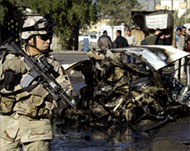Tide changing in US over Iraq war
New Jersey resident Thomas Jesymondo never viewed US President George Bush as a great leader but voted for him because he was convinced his administration would make the US a safer place after the 9/11 attacks.

In the past year, however, Jesymondo, a 47-year-old gym owner, has felt nothing but disappointment over the handling of the Iraq war and the direction the country is following and a new poll says he is in the majority.
He believes too much money and many lives have been wasted on a badly planned and executed war.
“If somebody laid out a plan that best protects the American people and the citizens of Iraq, then I would support the war,” he told Aljazeera.net.
Hoping to allay fears of Americans like Jesymondo, Bush delivered his administration’s strategy for victory in Iraq at Maryland’s Naval Academy last week.
The strategy was highlighted in a 35-page document titled Our National Strategy for Victory in Iraq, which rejected the notion of a timetable for withdrawal and said force reductions could only come about once substantial Iraqi security forces are trained.
But according to a CNN/USA Today/Gallup poll released right after Bush’s speech, 55% of Americans said they did not believe his administration’s plan would lead them to “victory”.
Worsening perception
American perceptions of the war have worsened as the number of US troops killed has surpassed 2130 and violence continues unabated with no clear victory or exit strategy in sight.
“At first I thought Bush was OK. Now I just don’t think he knows what he is doing. He dug a hole for himself and doesn’t know how to get out of it” Joel Auerbach,jeans manufacturer |
Nadim Shehadi, a Middle East expert at the London-based Royal Institute of International Affairs, believes that “this is a time when the foreign policy of the US is being driven by domestic pressures”.
“The resentment is being fuelled by local politics now that the mid-term elections are coming up.”
The resentment over the handling of the Iraq war came to a boiling point when Democratic Congressman John Murtha, who initially supported the war, called the president’s policies flawed and “wrapped in illusion”.
“Our military is suffering. The future of our country is at risk. We cannot continue on the present course. It is evident that continued military action in Iraq is not in the best interest of the United States of America, the Iraqi people or the Persian Gulf region,” he said at a press conference.
Joel Auerbach, a jeans manufacturer, said his concerns about the direction that the war was taking have only increased with time.
“At first I thought Bush was OK. Now I just don’t think he knows what he is doing. He dug a hole for himself and doesn’t know how to get out of it.”
Plummeting numbers
A Wall Street Journal poll recently put Bush’s approval rating at 34%.
 |
|
Anti-war sentiment is growing in |
According to USA Today/Gallup surveys, the numbers mark a steep decline from the days immediately after the 11 September 2001 attacks, when they stood at 90%.
In the days preceding 9/11, Bush’s approval rating stood at 51% and on 19 March 2003, immediately before the invasion of Iraq, the president’s approval rating ranged between 58% and 63%.
Texas resident Tina Carter believes that the president has a “lot on his plate at the moment” and that the world and the US had not anticipated how long the war would take.
“I think keeping our troops there is the right thing to do for the Iraqi people if we want to help them achieve democracy. After all, America is known for playing roles in freeing people. That’s our history.”
Human failure
But for Celesta Zappala from Philadelphia, the war marks a failure of human behaviour.
Her 30-year-old son, Sergeant Sherwood Baker, was killed in a bomb explosion in the spring of 2004 while guarding the Iraq Survey Group searching for weapons of mass destruction.
|
“I think keeping our troops there is the right thing to do for the Iraqi people if we want to help them achieve democracy. After all, America is known for playing roles in freeing people. That’s our history” Texas resident Tina Carter |
The group has since left Iraq declaring no such weapons were ever found.
“My son was a peaceful person. He was a teacher and a musician. He went to Iraq because he felt it was his duty and not because of the politics of it all.”
Zappala believes Bush has betrayed and misled the military. “Pre-emptively to use the war as a first strike is appalling and terrible. I think that people should start looking at the truth,” she told Aljazeera.net.
The growing popular distaste for the handling of the Iraq war has emboldened some in the Democratic party to push for a speedy withdrawal of US troops from the country.
Early withdrawal?
Democratic senator and 2004 presidential candidate John Kerry said this week that the US military must reduce its presence in Iraq by “at least 100,000”.
But Vice-President Dick Cheney said such a withdrawal would play right into the hands of “terrorists” and put the US at greater risk.
 |
|
More than 2100 US soldiers have |
“On this, both Republicans and Democrats should be able to agree: The only way the terrorists could win is if we lose our nerve and abandon our mission,” Cheney said at a military base in New York.
Boyd Lewis, a New York financial adviser, agrees that a hasty withdrawal could create a bigger “mess”.
Lewis, who was against the invasion from the onset, believes it will take at least a generation to see an end result in the Middle East.
There will be no overnight solution, he warned.